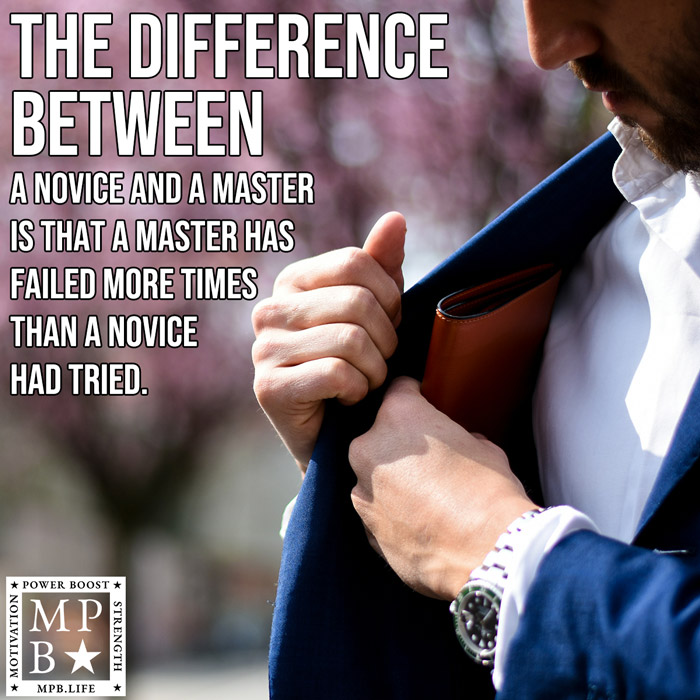
The Difference Between A Novice And A Master Graphic © motivationpowerboost.com
The difference between a novice and a master
is that a master has failed
more times than a novice had tried.
Mastery: The Art of Embracing Failure
Failure, often feared and avoided, is an integral part of the journey towards mastery. The path to success is paved with countless setbacks, disappointments, and seemingly insurmountable obstacles. However, it is through these very challenges that we grow, learn, and ultimately triumph. As the saying goes, “The difference between a novice and a master is that a master has failed more times than a novice had tried.”
This profound statement encapsulates the essence of what it takes to achieve greatness in any field. Novices, eager and enthusiastic, embark on their chosen paths with wide-eyed optimism. They try, stumble, and often become discouraged when faced with failure. Some may even abandon their pursuits, believing that their lack of immediate success is a sign of inadequacy.
Masters, on the other hand, understand that failure is not a roadblock, but rather a stepping stone. They have experienced the sting of defeat time and time again, yet they persevere. Each failure becomes a valuable lesson, an opportunity to reflect, adapt, and grow. Masters recognize that true growth lies not in the absence of failure, but in the resilience to rise above it.
The journey to mastery is not for the faint of heart. It requires unwavering commitment, relentless perseverance, and the courage to face failure head-on. Masters embrace the discomfort of being pushed beyond their limits, knowing that it is through these challenges that they will forge their skills and character.
Failure is not a reflection of one’s worth or potential. It is simply a natural part of the learning process. Every failed attempt brings us closer to our goals, as long as we approach it with a growth mindset. Masters view failure not as a personal shortcoming, but as a valuable feedback mechanism that guides them towards improvement.
The path to mastery is lined with countless stories of individuals who refused to let failure define them. Thomas Edison, one of the world’s most prolific inventors, famously stated, “I have not failed. I’ve just found 10,000 ways that won’t work.” J.K. Rowling, author of the beloved Harry Potter series, faced numerous rejections before her work was finally published. These examples serve as a testament to the power of perseverance in the face of adversity.
Embracing failure is not about seeking it out or glorifying it. Rather, it is about recognizing its inevitability and harnessing its transformative power. By reframing failure as an opportunity for growth, we can approach our goals with a sense of curiosity and determination.
So, dear reader, as you embark on your own journey towards mastery, remember that failure is not your enemy, but your ally. Embrace the challenges, learn from your missteps, and keep pushing forward. With each failure, you are one step closer to unlocking your full potential and achieving the greatness that lies within you.
In the words of Michael Jordan, one of the greatest basketball players of all time, “I’ve failed over and over and over again in my life. And that is why I succeed.” Let these words serve as a reminder that the path to mastery is not a straight line, but a winding road filled with obstacles and opportunities. Embrace the journey, for it is through the failures that you will find your greatest triumphs.
The Mindset of Mastery: Cultivating Resilience
Developing a mastery mindset is not solely about acquiring knowledge and skills; it is also about cultivating the mental fortitude to bounce back from setbacks and persevere. True masters possess an unwavering resilience that allows them to navigate the challenges and failures that inevitably arise on their path to greatness.
One key aspect of resilience is the ability to reframe failure as a learning opportunity. Instead of viewing setbacks as personal shortcomings or reasons to give up, resilient individuals approach them with curiosity and a desire to understand what went wrong. They ask themselves probing questions: “What can I learn from this experience?” “What adjustments can I make to improve?” By adopting this mindset, failures become stepping stones rather than roadblocks.
Another crucial component of resilience is the willingness to embrace vulnerability. Admitting mistakes and acknowledging areas for growth requires a certain level of humility and courage. Masters understand that perfectionism is an unrealistic and often counterproductive pursuit. They are comfortable with being imperfect and continuously striving for improvement, rather than seeking unattainable ideals.
Resilience also involves developing a strong support system. No one achieves mastery in isolation. Surrounding oneself with mentors, peers, and individuals who can provide encouragement, constructive feedback, and guidance is invaluable. This support network can offer perspectives, insights, and motivation when faced with challenges, helping to maintain focus and determination.
Ultimately, cultivating resilience is about developing a growth mindset – the belief that abilities and talents can be developed through effort, perseverance, and a willingness to learn. This mindset empowers individuals to embrace challenges, view failures as temporary setbacks, and continuously strive for improvement. It is the foundation upon which mastery is built, as it allows for the persistence and determination necessary to overcome obstacles and reach new heights.
Achieving mastery is not a sprint; it is a marathon that requires unwavering commitment and a resilient mindset. By reframing failures, embracing vulnerability, building a support system, and adopting a growth mindset, individuals can develop the mental fortitude to navigate the inevitable challenges that arise on the path to greatness.
Related Inspirational Quotes
“The man who moves a mountain begins by carrying away small stones.” – Confucius
“Failure is the opportunity to begin again more intelligently.” – Henry Ford
“It’s not that I’m so smart, it’s just that I stay with problems longer.” – Albert Einstein
“The phoenix must burn to emerge.” – Janet Fitch
“Do not fear mistakes, there are none.” – Miles Davis
